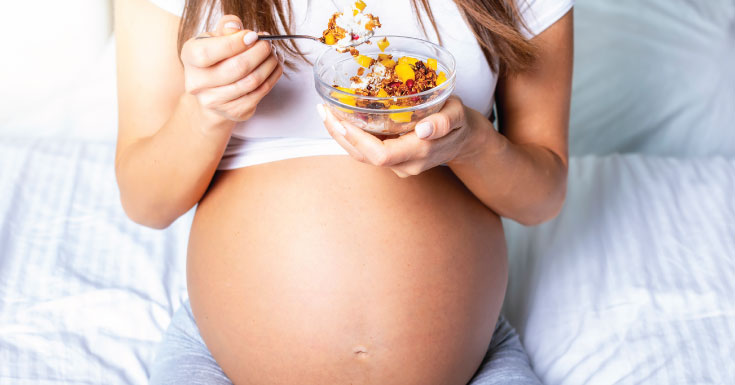A well-balanced diet comprising essential food groups is important during pregnancy. Proper intake of macro and micronutrients ensure the health of both the baby and mother. However, many mothers who are vegetarians or vegans may be concerned that their plant-based diets would not be suitable at this time.
According to the American Dietetic Association, well planned vegetarian diets are safe for all age groups and physiological conditions, including childhood, adolescence, pregnancy, and lactation. However, the German Nutrition Society does not recommend vegetarian or vegan diets during pregnancy, lactation, and childhood, due to the inadequate supply of essential nutrients.
In this article, let’s look at the benefits and risks of a vegan pregnancy so you can make the best choices during this time.
Vegan Diet Benefits for Mom and Baby
Vegan diets, which contain only food types made from plants, are known to offer a variety of benefits. The good news is these healthy effects can also benefit pregnant women. For example, vegan diets consisting of high-fibre meals have been shown to reduce the risk of gestational or pregnancy diabetes. A higher fibre intake also helps with relieving constipation – a common complaint during pregnancy.
Some studies report a lower risk of caesarean section (C-section) delivery, maternal or infant mortality, and postpartum depression in pregnant women on a vegan diet. Further studies reveal that preeclampsia appears to be lower among vegans.
TAKE NOTE:
If you decide to take a multivitamin and mineral supplement, select one specifically for pregnancy. Make sure it does not contain vitamin A, as high levels of vitamin A during pregnancy can harm your baby.
Source: www.nutrition.org.uk
Risks of Vegan Diets During Pregnancy
Any diets that restrict certain foods would affect pregnancy in negative ways. This includes poorly planned vegan or vegetarian diets, which lack important nutrients like vitamin B-12, iron, DHA, protein, and calcium.
Vitamin B12, which is not available via a plant-based diet, can cause serious birth defects, including spina bifida (deformation of the baby’s spine), anencephaly (born without parts of the brain and skull), and encephalocele (sac-like protrusion of the brain).
Various studies on protein deficiency during pregnancy also found a range of health issues in babies and moms. Apart from being underweight, infants may also develop kidney problems. Additionally, protein deficiency during pregnancy leads to fat accumulation in the liver and an increased risk of liver damage in mothers. The lack of other vital nutrients like iodine, iron, folate, calcium, and zinc can also cause anaemia, haemorrhage, and even death in mothers.
Guidelines for a Healthy Vegan Pregnancy
The key to a safe and successful vegan pregnancy is to ensure your diet is well-balanced and contains a variety of essential nutrients. Always talk to your doctor before choosing any kind of diet. It’s also a good idea to consult a dietician on how you can get enough nutrients for you and your baby.
Here are some key tips to make sure a vegan diet sufficiently meets your nutritional requirements during pregnancy:
- Aim for balance and variety when preparing your daily meals
- Meet your increased energy needs with nutritious foods with higher caloric density. For example, fortified vegan milks such as soy, rice, or almond, nuts and nut butters, dried fruits, natural fats like avocado and olives, soy products, and bean dips are excellent and delicious high-energy foods.
- Consume sufficient protein. High-protein plant foods include beans, lentils, and peas, as well as grains like brown rice. Vegetables like spinach, broccoli, edamame, potatoes, sweet potatoes, brussels sprouts, and artichokes also contain protein. Most pregnant vegans may require protein supplements to complement their daily diet.
- B12 is important in a vegan pregnancy. The recommended intake is 2.6 micrograms per day. While vitamin B12 is included in all standard prenatal supplements, you can also boost your intake with common B12-fortified foods like breakfast cereals, soy and other plant-based milks, nutrition bars, and meat substitutes. There’s a misconception that tempeh, sprouted beans, sea vegetables, and algae are reliable sources of B12. However, they are not – these foods may contain B12 analogues, which actually block vitamin B12 absorption.
- Get enough iron. You would also need to consume vitamin C to maximise iron absorption. Good vegan sources of iron are spinach and other leafy greens, dried fruits, baked potatoes, beans and peas, tofu, seeds, nuts, and soy milk.
- Take omega-3 fatty acids daily as the required intake is nearly double the amount of non-pregnancy needs. Good vegan sources of these fats include flaxseeds and their oil, leafy green vegetables, soy products, soy milk fortified with DHA, walnuts, and canola oil.
- Stay hydrated – your fluid needs also increase during pregnancy. Water is the best, but you can also drink soups and other healthy beverages. However, limit coffee and sugary drinks.
- Exercise daily. Walking and yoga are excellent forms of low-impact workouts for pregnant women.
TAKE NOTE:
Vegan diets tend to be high in folate; however, to be on the safe side, moms-to-be should take a supplement or use fortified foods that provide 400 micrograms of folate daily.
Source: vrg.org


